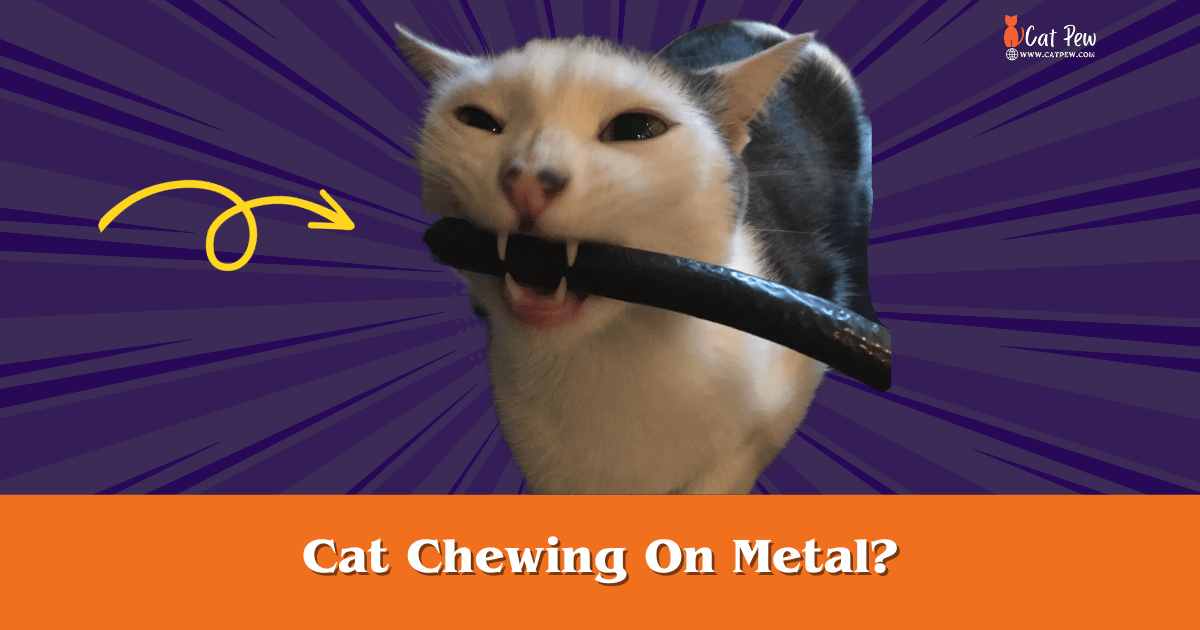Cat Chewing On Metal
Cats may chew on metal objects as a way to alleviate dental pain or discomfort caused by issues like gum disease or periodontitis. This behavior can also be a sign of a mineral deficiency or pica, which is a tendency to crave strange things.
However, regularly chewing on metal or other inedible items can be dangerous for cats, as it can lead to cuts in their mouths or throats, resulting in infection and illness. It is important to address the underlying cause of the behavior and take steps to prevent cats from chewing on metal.
Understanding The Reasons Behind A Cat Chewing On Metal
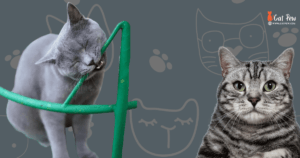
When it comes to peculiar feline behaviors, cats chewing on metal objects can be quite perplexing. While it may seem unusual, there are several reasons why your beloved cat may have developed this habit. Understanding the underlying causes can help you address the issue and prevent any potential harm to your furry friend.
Cats With Dental Issues And The Urge To Soothe Their Teeth
Cats, just like humans, can suffer from dental issues that may lead to discomfort or pain. Gum disease and periodontitis are common dental conditions in cats that can result in inflamed gums and toothache. In an attempt to alleviate their discomfort, cats may resort to chewing on metal objects, providing some relief to their teeth.
Gum Disease And Periodontitis As Contributing Factors
Gum disease and periodontitis are often caused by a buildup of plaque and tartar on the teeth, leading to inflammation and infection. When left untreated, these conditions can cause significant discomfort, making cats more prone to chewing on metal to ease their dental pain.
Nutrient Deficiency And Feline Pica
Another possible reason for a cat’s inclination to chew on metal is nutrient deficiency, specifically a lack of essential minerals such as iron. Feline pica, which refers to a tendency to crave and chew on non-food substances, can be driven by a nutrient imbalance in a cat’s diet. In such cases, your cat may crave metallic objects due to the minerals they contain.
Behavioral Disorder Or Predatory Instinct
Occasionally, cat chewing on metal may be a result of behavioral issues or instinctual behaviors. Boredom or attention-seeking can trigger cats to engage in abnormal chewing behaviors, and metallic objects might simply catch their attention. Additionally, some cats have a predatory instinct that drives them to chew on metal objects that resemble prey or capture their curiosity.
To prevent any potential harm to your cat or damage to your belongings, it’s crucial to address the underlying cause of their metal-chewing behavior. Identifying and addressing dental issues, ensuring a balanced diet, providing mental stimulation, and offering appropriate chew toys can help redirect their chewing habits away from metal objects.
Potential Risks And Consequences Of Cats Chewing On Metal
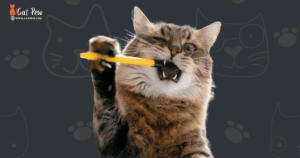
Nd a chew can be their way of exploring their environment or alleviating stress. However, chewing on metal objects like jewelry or zippers can pose potential risks for cats, including mouth and throat injuries that may lead to infection and illness.
It is important to address this behavior and provide appropriate alternatives to prevent any harm to your feline friend.
Increased Risk Of Injuries And Infections
When cats chew on metal objects, such as jewelry or zippers, they are putting themselves at an increased risk of injuries and infections. Metal objects can have sharp edges or rough surfaces that can cut the delicate tissues in a cat’s mouth and throat. These cuts can lead to bleeding and can also create an open pathway for bacteria to enter the body, increasing the risk of infections.
Cuts To The Mouth And Throat
One potential consequence of cats chewing on metal is cuts to their mouth and throat. The sharp edges or rough surfaces of metal objects can easily cause lacerations in the soft tissues of a cat’s oral cavity. These cuts can be painful and may even lead to excessive bleeding. Furthermore, the mouth and throat are already prone to bacterial infections, and the presence of cuts only exacerbates the risk.
Potential Illness And Health Complications
In addition to the risk of injuries and infections, cats chewing on metal can also lead to potential illness and health complications. When a cat’s mouth or throat is injured, it becomes more vulnerable to the entry of harmful bacteria. These bacteria can cause various infections, such as oral infections, upper respiratory infections, or even systemic infections if left untreated. Additionally, the act of chewing on metal objects may indicate underlying health issues or nutritional deficiencies. Cats may exhibit pica, a condition characterized by the craving and consumption of non-food items, including metal. This behavior can be a result of nutrient deficiencies or behavioral disorders. Therefore, it is vital to address any underlying health conditions to prevent further complications. To keep your cat safe and prevent them from chewing on metal objects, it’s essential to provide them with appropriate toys, dental treats, and regular veterinary care. Ensuring that your cat has a balanced diet and receives all essential nutrients will also reduce the likelihood of them seeking unconventional materials to chew on. Remember, if your cat continues to exhibit this behavior, consult with your veterinarian to determine the root cause and appropriate solutions.
Identifying And Addressing Medical Causes Of Cat Chewing On Metal
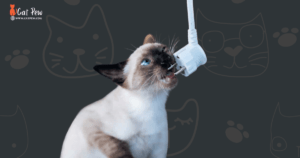
Cats chewing on metal objects may be indicative of dental issues such as gum disease or periodontitis causing discomfort. It could also be a result of a mineral deficiency or pica, a tendency to crave strange things. Regular chewing on metal can lead to mouth or throat injuries.
Visiting A Veterinarian To Rule Out Medical Conditions
If your cat is chewing on metal, it is important to first rule out any underlying medical conditions that may be causing this behavior. Schedule a visit to the veterinarian to have your cat examined. The veterinarian will perform a thorough physical examination and may also recommend additional diagnostic tests, such as blood work or dental X-rays, to identify any potential medical issues.
Discussing The Cat’s Dental Health And Possible Treatment Options
During your visit to the veterinarian, they will also assess your cat’s dental health. Dental problems, such as gum disease or periodontitis, can cause discomfort and lead to a cat chewing on metal objects to soothe their teeth. If dental issues are identified, the veterinarian may recommend treatment options such as professional dental cleaning, extractions, or specialized dental diets.
Examining The Cat’s Diet And Ensuring They Are Receiving The Right Nutrients
Another factor to consider when addressing cat chewing on metal is their diet. Cats may chew on metal objects if they are lacking certain nutrients, such as iron. It is important to assess your cat’s diet and ensure they are receiving a balanced and nutritious meal. Your veterinarian may recommend specific dietary changes or supplements to address any nutrient deficiencies.
In conclusion, if your cat is chewing on metal objects, it is crucial to investigate and address any potential medical causes. By visiting a veterinarian, discussing dental health, and examining your cat’s diet, you can identify and address the underlying issues that may be contributing to this behavior. Remember, the well-being of your cat should always be your top priority!
Implementing Behavioral Strategies To Stop Cat Chewing Behavior
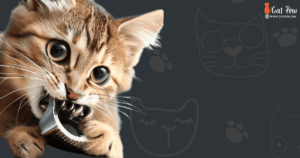
If your cat is chewing on metal objects, it may be a sign of dental issues such as gum disease or periodontitis. Implementing behavioral strategies like providing appropriate chew toys and dental care can help address this behavior and prevent any potential harm to your cat.
Providing Adequate Mental And Physical Stimulation For The Cat
One effective approach to stop cat chewing behavior is to ensure that your furry friend receives sufficient mental and physical stimulation. This is achieved by engaging in various activities with your cat. Regular play sessions using interactive toys can help redirect their chewing tendencies and provide an outlet for their natural hunting instincts.
Additionally, providing environmental enrichment such as scratching posts, climbing trees, and puzzle toys can keep your cat mentally engaged and prevent boredom, reducing the likelihood of destructive chewing behaviors.
Engaging The Cat In Interactive Play Sessions
Interactive play sessions are essential for curbing cat chewing behavior. Set aside dedicated time each day to engage your cat in play using toys that simulate prey, such as feather wands or laser pointers. Encourage your cat to chase, leap, and pounce, offering a healthy outlet for their energy.
When engaging in play sessions, keep your cat’s safety in mind. Avoid using objects or toys made of metal, as this could inadvertently reinforce their chewing behavior. Stick to safe and appropriate toys made specifically for cats.
Offering Appropriate And Engaging Chew Toys
Cats have a natural urge to chew, and providing them with appropriate chew toys can redirect their chewing behavior away from metal objects. Choose chew toys made of durable materials such as rubber or non-toxic plastics specifically designed for cats.
Provide a variety of textures to keep your cat entertained and satisfied. Some chew toys come with ridges or grooves, which can help clean their teeth and gums while giving them a satisfying chewing experience.
Creating A Safe And Cat-friendly Environment
To prevent your cat from chewing on metal objects, it’s crucial to create a safe and cat-friendly environment. Secure and store away any metal items that may be tempting for your cat to chew on, such as jewelry, zippers, or utensils.
Use deterrents such as bitter sprays or double-sided tape to discourage your cat from approaching or chewing on metal objects. Additionally, provide alternative chewing options such as cat grass or safe plants, to steer their attention away from metal.
Consistency And Positive Reinforcement In Training
Consistency and positive reinforcement play a vital role in modifying cat behavior. Establish a consistent routine that includes playtime, feeding, and designated chewing sessions with appropriate toys.
When your cat displays desired behavior, reward them with praise, treats, or affection. This positive reinforcement helps strengthen the connection between good behavior and positive outcomes, making them more likely to continue their new habits.
Tips For Cat Owners To Prevent And Discourage Cat Chewing On Metal
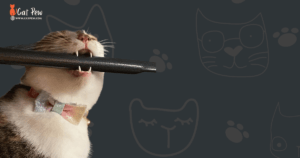
Cat owners can prevent and discourage cat chewing on metal by addressing potential dental issues, such as gum disease or periodontitis, that may cause cats to seek relief from pain or discomfort through chewing. Providing appropriate toys and engaging activities can also redirect cats’ attention away from metal objects.
Keeping Metal And Other Potentially Harmful Objects Out Of Reach
Cats are naturally curious creatures, and their chewing behavior can sometimes lead them to chew on metal objects, which can be dangerous for them. To prevent this behavior, it’s essential to keep metal objects out of your cat’s reach. Store your flatware, jewelry, and other metal items in closed drawers or cabinets, ensuring they are securely locked. This will not only protect your belongings but also ensure your cat’s safety.
Using Deterrent Sprays Or Unpleasant Smells On Metal Objects
If your cat seems particularly attracted to metal objects, using deterrent sprays or creating unpleasant smells on those items can help discourage chewing behavior. Look for pet-friendly deterrent sprays available in the market and apply them to the metal objects your cat is attracted to. Alternatively, you can create your natural deterrent by using bitter apple spray or vinegar. Just make sure to test a small area of the metal object first to ensure it won’t cause any damage.
Providing Alternative Outlets For The Cat’s Chewing Needs
Cats have an instinct to chew, and it’s important to provide them with appropriate outlets for this behavior. To satisfy your cat’s chewing needs, offer a variety of safe and chewable toys specifically designed for cats. Look for toys made of durable materials like rubber or soft materials that simulate the texture of prey. By directing their chewing behavior towards these toys, you can help prevent them from turning to metal objects.
Supervising The Cat’s Behavior And Redirecting Their Attention When Necessary
Supervising your cat’s behavior is crucial in preventing and discouraging the cat chewing on metal. If you catch your cat in the act of chewing on metal, quickly redirect their attention to an appropriate chew toy. You can do this by using a firm “no” command and immediately giving them a toy to chew on instead. Consistency is key, so regularly supervise your cat and intervene whenever necessary to reinforce the desired behavior.
Frequently Asked Questions For Cat Chewing On Metal?
Why Does My Cat Chew On Metal Things?
Cats may chew on metal objects due to dental issues or a mineral deficiency. It can also be a sign of behavioral disorder or predatory instinct. However, regular chewing on metal can harm the cat’s mouth and cause illness.
Why Does My Cat Chew On Plastic And Metal?
Cats may chew on plastic and metal due to dental issues, nutrient deficiency, behavioral disorders, or predatory instincts. It can also be a sign of stress or anxiety. Chewing on non-food items can lead to mouth or throat injuries in cats and should be prevented.
Why Is My Cat Chewing On Hard Things?
Cat chewing on hard things can be a sign of dental issues, such as gum disease or periodontitis. It can also be a result of nutrient deficiency or a behavioral disorder. Cats may chew on metal objects to soothe their teeth or satisfy cravings.
However, it’s important to prevent excessive chewing to avoid mouth or throat injuries and infections.
How Do I Know If My Cat Has Pica?
Symptoms of pica in cats include chewing, sucking, or ingesting non-edible materials such as metal objects. It can indicate dental issues, mineral deficiencies, behavioral disorders, or predatory instincts. Regular chewing on metal objects can lead to mouth or throat injuries and infections.
If you suspect pica, consult a veterinarian to rule out any underlying medical causes and address the behavior.
Conclusion
To conclude, cats chewing on metal objects can indicate various underlying causes such as dental issues, nutrient deficiencies, behavioral disorders, or predatory instincts. It is important to address this behavior to prevent potential injuries or health problems for your feline companion.
Consulting with a veterinarian can help determine the cause and provide appropriate solutions to prevent further chewing on metal objects. Additionally, engaging in mental and physical stimulation, providing appropriate toys, and ensuring a balanced diet may help redirect your cat’s chewing behavior.

Winston
I'm Winston, the author of this feline-focused (Catpew.com) blog . My love for cats goes back to my childhood, when I spent countless hours playing with my family's tabby, Mittens. This furry friend instilled in me a deep appreciation for the unique personalities, playful nature, and unconditional love that cats offer.

